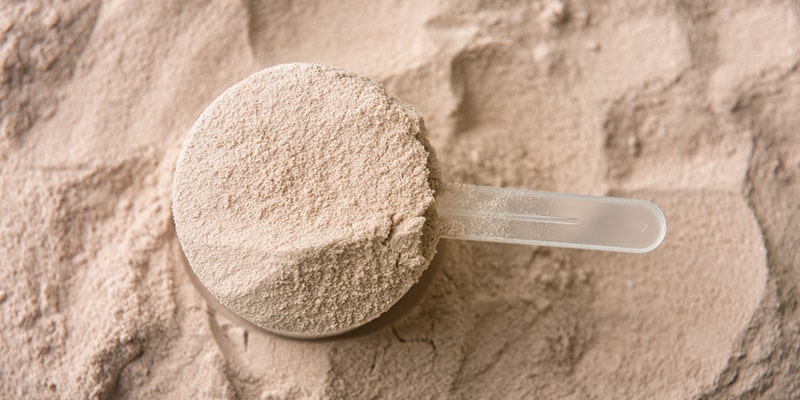Why It Matters That Your Protein Is Pure

There’s no question that you need protein. Whether your goal is to lose weight, build and maintain muscle, or just function properly, having an adequate protein intake is crucial.
While cooking healthy, high protein meals, such as grilled chicken or lean ground-beef is ideal, this is not always feasible. With jobs, families, responsibilities, and workouts to crush, adding just one more thing to your plate (pun intended) can be difficult.
That’s where protein supplements come into play. Grabbing a protein bar as you run out the door or mixing up a protein shake post-workout are easy and efficient ways to meet your protein requirements. But keep in mind that not all protein is created equal.
Some protein supplement companies are using subpar ingredients, incomplete proteins, and harmful additives. And the worst part? Most consumers aren’t even aware that the purity of their protein supplement has been compromised due to labeling claims that can often be misleading.
Since Performance Inspired is dedicated to honest and better sports nutrition, we’re going to dig deep in this post in order to explain why it matters that your protein is pure.
Protein powder 101

If you’ve never used a protein powder before, choosing one to fit your needs can be overwhelming with all of the different forms and brands on the market today. This section will give you the breakdown on what differences exist between various protein formulations.
First, it’s important to know that there are different forms of protein used in protein powders, with the three most common ones being whey, soy, and casein proteins.
Peter Horvath, PhD, associate professor in the department of exercise and nutrition sciences at the State University of New York at Buffalo, shares with WebMD: “Whey is the most commonly used, because it’s a water-soluble milk protein. It’s also a complete protein, so it’s got all those advantages.” For a protein supplement to be considered “complete” means it contains all nine of the amino acids necessary for human dietary needs. Additionally, since whey is packed full of BCAAs such as leucine, isoleucine, and valine, it may help preserve lean muscle tissue between workouts or when dieting.
Soy protein can be an option for vegans who wish to add more protein to their diets, although Horvath notes that its taste is sometimes considered to be more unpleasant, and it doesn’t dissolve as well in water.
According to The Greatist, casein protein powder offers similar benefits to whey protein, but it digests over a longer period of time. Since it’s absorbed so slowly, it’s not ideal as a post-workout supplement. Plus, casein often contains many artificial ingredients to help make it more palatable.
What makes a protein supplement pure?
When discussing the purity of a protein supplement, it is important to note that no supplement is going to be 100% pure. For example, if a product is called “100% whey protein” it is referring to the protein source used, meaning only whey protein is used, not egg, soy or milk protein. (Nutrition Express)
So how can you determine the actual purity of a protein supplement? First, you’ll need to check if the product’s label says “whey concentrate” or “whey isolate”. The difference between these terms is that whey isolate goes through an additional filtering step to remove more fat and carbohydrates.
Furthermore, in terms of purity, whey concentrate is approximately 80% protein and whey isolate is approximately 90% protein. Therefore, a product with “100% whey protein” on its label would contain about 80% protein (if it’s from a concentrate). The other 20% of the supplement is made up of 5% water, 3-5% naturally occurring minerals in whey, and 10-12% is a combination of fat and carbs. (Nutrition Express)
Manufacturing pure protein
One aspect to keep in mind when examining the purity of a protein supplement is the manufacturing process. This begins with ensuring that the product is manufactured in a facility that adheres to Good Manufacturing Practice (GMP) standards and follows the FDA guidelines for quality and safety.
Additionally, there are ways that protein can be processed that will actually take away from the protein’s purity. Foodmatters.com explains that, “Most commercial whey powders are high-heat-treated, acid-flushed, and stripped of vital nutrients.”
Supplement manufacturers need to take great care in order to keep protein in its native state.
This involves carefully monitoring the pasteurization process to keep the heating of the whey as close as possible to the minimum temperature for the minimum time required to legally pasteurize whey.
Pure protein is free of harmful additives

Another reason why it matters that your protein is pure is based on the health risks associated with harmful additives that have been found in supplements. Many commercial protein supplements can be contaminated with synthetic additives, chemical detergents, and heavy metals, according to foodmatters.com.
To make matters even worse, these companies will throw in unhealthy sweeteners and artificial flavors in order to cover up the unpleasant, acidic aftertaste of these additives. Artificial sweeteners, such as sucralose, aspartame and acesulfame, have been linked to serious health implications, such as obesity and related diseases. This is because the sweet taste without any real food ingredients confuses your brain, which can lead to overeating.
Forbes shares another concern regarding additives that take away from the purity of protein: “A growing number of companies are accused of selling workout supplements spiked with cheap fillers that they’re passing off as protein.” The article discloses that companies like CVS Health and MusclePharm may be selling products where the protein content falls far below what’s on the label.
The final verdict: it matters that your protein is pure
At Performance Inspired Nutrition, we understand how important it is for your protein sources to be as pure as possible. In fact, our inspiration to create PI products started with the need for natural, high performance products that we could trust were clean in their formulations.
While all natural products are more costly and harder to formulate, we never considered cutting corners or taking the easy way out. All of our products use the most effective amount of each active ingredient, are manufactured in a world class Good Manufacturing Practice (GMP) plant, and are free of any artificial sweeteners or synthetic additives.
Plus, with whey protein powders in flavors like Natural Chocolate, Vanilla Bean, Mocha and Vanilla Latte and bars like Brownie Chocolate Blast, Cookies N’ Cream Extreme and Peanut Butter Chocolate Thunder, you’re going to get the best ingredients and the best nutrition with the best taste.
#TradeUp to the better all natural sports nutrition!



2 thoughts on “Why It Matters That Your Protein Is Pure”
I lift, so i use some whey between meals, etc. But i am worried that what’s in the jar of “whey protien” might not always BE whey protein; or it might be cheap low-protein concentrate rather than high level concentrate(80%) or isolate, as it says on the label. I doubt if the FDA tests them anymore; i understand GW Bush gutted it. “free enterprise ” you know.
Any suggestions? thank you, Joe
Nice One…